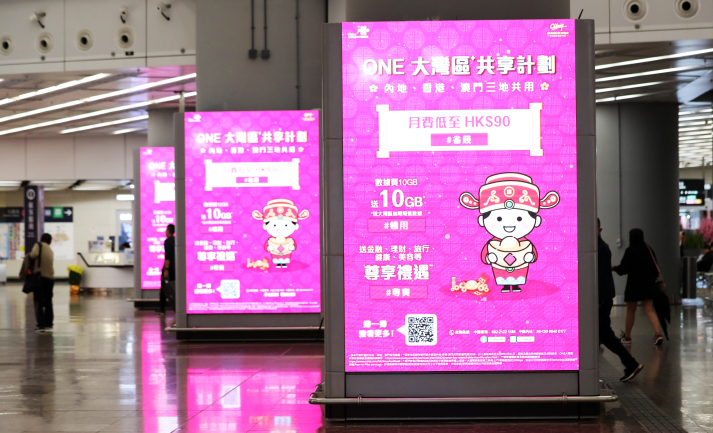|
||||||
|
||||||
| Home Nation World Business Opinion Lifestyle China Focus ChinAfrica Video Multimedia Columnists Documents Special Reports |
|
||||||
|
||||||
| Home Nation World Business Opinion Lifestyle China Focus ChinAfrica Video Multimedia Columnists Documents Special Reports |
| Nation |
| Greater integration with mainland holds promise for Hong Kong |
| Hong Kong has become an important bridge connecting the Chinese mainland and world markets |
| By Zhang Shasha · 2020-06-12 · Source: NO.25 JUNE 18, 2020 |
 A Greater Bay Area media delegation visits City Gallery in Hong Kong on May 21 (XINHUA)
After Hong Kong returned to the motherland in 1997, the Chik family in Zhejiang Province in east China decided to shift their garments business from Thailand to the new special administrative region (SAR) and settle down there due to the huge room for development they saw there. Their daughter Momo was a child at that time. Today, she is a 30-year-old financial professional in Hong Kong who has roots both on the mainland and in the SAR. Last year, she was stunned by the protracted violent protests in Hong Kong, which left her wondering what could have caused the misunderstandings. "I've been thinking how they will end after hurting Hong Kong greatly and putting people in jeopardy," she said. Mutual benefits As a center of international trade and commerce, logistics, shipping, finance and professional services, Hong Kong has become an important bridge connecting the Chinese mainland and world markets. Since the late 1970s, Hong Kong's per-capita GDP in dollar terms has increased 11 times, surpassing Germany, the UK and Japan. According to the General Administration of Customs of China, the mainland's trade in goods has increased by 198 times in value since then while Hong Kong's exports have jumped 71 times. According to Tung Chee-hwa, Vice Chairman of the Chinese People's Political Consultative Conference National Committee, the top political advisory body, and the first Chief Executive of Hong Kong SAR, the SAR has taken an active part in China's reform and opening up, making significant contributions. At the same time, the rapid development of the country as a whole has also been a boon for it. Chik is a beneficiary of Hong Kong's return. DL Holdings (China), the company where she works, was founded by a couple from the mainland. According to Victor Ai, Co-Chairman of the company, a financial services platform, local young people account for half of its employees. Chik has also benefited from an admission scheme on the mainland designed specifically to recruit students from overseas and from Hong Kong, Macao and Taiwan. She passed the recruitment exam and got the chance to study in a university in Beijing. Hong Kong's return has stimulated capital and talent flows between the mainland and the SAR. Ai was attracted by Hong Kong's developed financial system and cultural environment. He has been working there for almost three years. He came through the Admission Scheme for Mainland Talents and Professionals (ASMTP), which aims to attract talents from the mainland to enhance Hong Kong's competitiveness. Each year, a large number of people like Ai come to live and work in Hong Kong through the ASMTP and other talent schemes such as the Quality Migrant Admission Scheme and the Technology Talent Admission Scheme. In 2018-19, about 30,000 people came through the ASMTP. When the financial crisis that rattled Asia in 1997 and the severe acute respiratory syndrome in 2003 inflicted heavy losses on Hong Kong's economy, the Central Government took measures to help Hong Kong tide over the difficulties. In 2003, the Central Government and the Hong Kong SAR Government signed the Closer Economic Partnership Arrangement, a free trade agreement that gave businesses in Hong Kong greater access to the huge mainland market and brought new opportunities for mainland enterprises to reach out to the global market through the SAR. The Central Government has adopted policies to draw more mainland tourists to Hong Kong and encourage mainland enterprises to make initial public offerings in Hong Kong. It has also launched mechanisms to link their financial markets such as the Shanghai-Hong Kong Stock Connect. In 2017, a framework agreement on the Guangdong-Hong Kong-Macao Greater Bay Area, which encompasses nine cities on the mainland, Hong Kong and Macao, was signed. This integrated development plan is playing a crucial role in sustaining Hong Kong's progress.  (Top) Billboards at the West Kowloon Railway Station in Hong Kong advertise preferential telecom service fees in the Guangdong-Hong Kong-Macao Greater Bay Area on January 24 A Greater Bay Area media delegation visits the City Gallery in Hong Kong on May 21 (XINHUA)
Communication gap However, the benefits may not be widely known in Hong Kong. The admission scheme that benefited Chik, for instance, did not get noticed by many students, and some do not think of going to the mainland for higher education, Chik said. "So they fail to get the whole picture about the development of the mainland," she added. It is therefore important to promote a wider knowledge about the Central Government's policies and conditions on the ground in the mainland. She also pointed out other causes for misunderstandings, like history education, referring to a recent incident in Hong Kong that triggered outrage. In a university admission exam for high school students, a history question asked, "'Japan did more good than harm to China in the period 1900-45.' Do you agree?" Students were required to answer this question based on two sources, both of which highlighted Japan's role in helping promote modernization in China, while no information was given on its aggressive acts. It was therefore decried as an attempt to whitewash the atrocities committed by invading Japanese forces in that period and the anger led to the local authorities scrapping it. "The collapse of education is the collapse of a nation," Hong Kong SAR Chief Executive Carrie Lam said after the furor, alluding to a famous quote by Nelson Mandela to appeal to all stakeholders in Hong Kong to preserve the value of education for the sake of the younger generation. "When people receive an incorrect message and think it is normal at a young age, it will be difficult for them to rectify the thinking later," Chik said. Then there are also issues like astronomical property prices in Hong Kong and instigation of violence by external forces. All these have combined to result in misunderstandings and insecurity, Chik said. The question is how to break the barriers. The Guangdong-Hong Kong-Macao Greater Bay Area plan is a step toward greater integration. It will produce new growth drivers for Hong Kong's economy and create more opportunities for the SAR's residents to pursue better lives, Secretary for the Civil Service of the Hong Kong SAR Government Patrick Nip Tak-kuen said. In November 2019, a series of policies were announced to make it easier for Hong Kong and Macao residents to live, work, study and start businesses in mainland cities in the Greater Bay Area. They will be treated as local residents when buying properties in the nine cities in Guangdong Province if they meet the tax and other criteria. Ai said the Greater Bay Area, where people speak the same Cantonese dialect and share similar cultural backgrounds, can be a catalyst for greater mainland-Hong Kong integration. With its preferential policies on housing, employment and tax, it can attract people from Hong Kong to settle down in mainland cities. (Print Edition Title: Cementing Bonds) Copyedited by Sudeshna Sarkar Comments to zhangshsh@bjreview.com |
| About Us | Contact Us | Advertise with Us | Subscribe |
| Copyright Beijing Review All rights reserved 京ICP备08005356号 京公网安备110102005860号 |